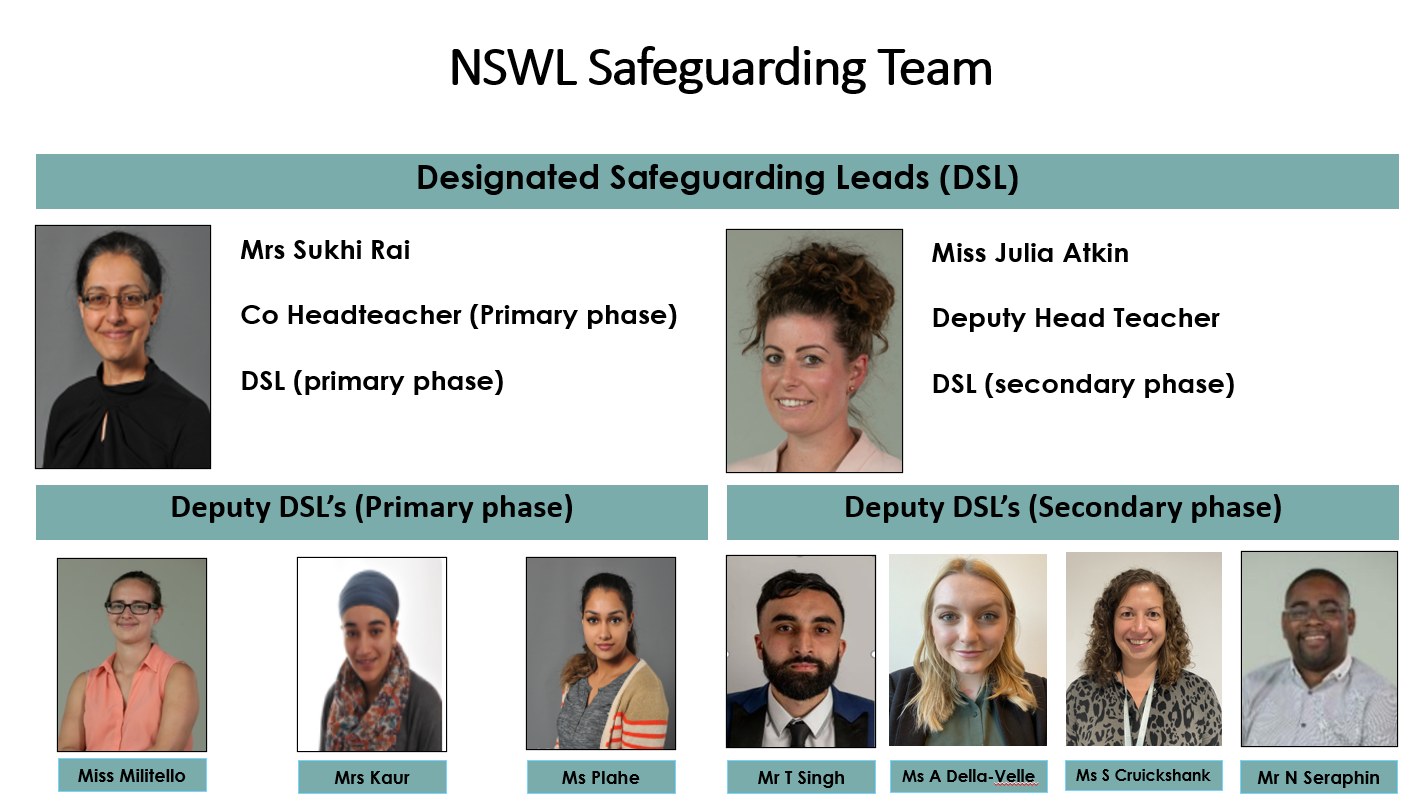Safeguarding and Pastoral Care
“Safeguarding and promoting the welfare of children is defined for the purposes of this guidance as: protecting children from maltreatment; preventing impairment of children’s health or development; ensuring that children grow up in circumstances consistent with the provision of safe and effective care; and taking action to enable all children to have the best outcomes.“
KCSIE (Keeping Children Safe In Education) - 2025
Nishkam Commitment to Safeguarding & Child Protection
At Nishkam School we are committed to safeguarding children and young people and we expect everyone who works in our school to share this commitment.
Adults in our school take all welfare concerns seriously and encourage children and young people to talk to us about anything that may worry them.
Safeguarding Contacts in School

Please click here for the NSWL Safeguarding Policy.
Communication with Parents
Our school will always discuss concerns with parents/carers and consent for any referrals should be sought unless to do so would:
- Place the child at risk of significant harm or further risk of significant harm.
- Place a vulnerable adult at risk of harm.
- Compromise any enquiries that need to be undertaken by children’s social care or the police.
The school will endeavour to ensure that parents have an understanding of the responsibilities placed on the school and staff for safeguarding children.
In the best interests of safeguarding children there may be occasions when the school has to consult with other agencies without a parent or carer’s prior knowledge. Our first concern and responsibility is the child’s welfare and we have a duty to protect children first and always. Such consultation may result in a formal referral which could prompt visits from social care and/or the police. We fully understand that this can be a very distressing set of circumstances. Our school will follow the procedures required by the Hounslow Safeguarding Children Board.
Safeguarding Policy and addendum
Curriculum
Child safety issues and child protection will be addressed through the curriculum where appropriate, especially through PSHE, Computing and E-Safety, Citizenship, Sex and Relations Education (SRE) and British values.
We use a variety of resources and approaches to teach the children how to keep themselves safe, build their resilience and manage risks.
The curriculum, and in particular the personal, social and health education development strand of the curriculum, includes an emphasis on relationships (relationships and sex education), building confidence and resilience in pupils and in developing preventative strategies to ensure their own protection and that of others. Opportunities are provided for pupils to develop the skills and strategies they need to stay safe from abuse, including age appropriate discussions about healthy relationships, their bodies and being able to say no to requests that they do not want to carry out. Clear advice and guidance is built into the curriculum to ensure that pupils understand that there is a range of contacts they can turn to for advice and support and that they know where and how to report abuse.
Child Sexual Exploitation
Child Sexual Exploitation (CSE) is a form of sexual abuse which sees children/young people being manipulated or coerced into sexual activity for receiving ‘something’ such as; gifts, money, food, attention, somewhere to stay etc. Technology is very often used to groom victims. This may occur through social networking sites and mobile phones with internet access. CSE has gained a large amount of media attention over the last year as lots of services involved with children and young people have noticed a big rise in cases involving CSE.
Charities such as NSPCC and Barnardos have been campaigning to raise the profile of this form of child abuse.
Internet Safety
Children and young people spend lots of time on the internet. They may go online to research information for homework or to play games, chat with friends and make new ones. The internet holds a massive amount of useful information and can also be a really good way of learning about new things and keeping in contact with friends and family. It can also be a very dangerous place so it is important that children are protected and monitored when they are online.
CEOP (Child Exploitation and Online Protection) has lots of information about how to keep your children safe online and parental controls. The link to the website is below.
Please see below a number of apps/social media and websites which summarises the content available for young pupils regarding E-safety:
Child Exploitation and Online Protection safety-centre
The website below is aimed at parents to help understand internet social media, apps and gaming
The website below has advise regarding gaming ratings and what they mean:
Parentinfo.org pegi games ratings explained
Popular apps with an overview of the app and age restrictions
Social media/sites/apps
| Age restriction |
||
|---|---|---|
 |
Instagram is a picture and video sharing app. Users can post content and use hashtags to share experiences, thoughts or memories with an online community. You can follow your friends, family, celebrities and even companies on Instagram. Instagram allows live streaming. | 13+ |
 |
YouTube allows you to watch, create and comment on videos. You can create your own YouTube account, create a music playlist, and even create your own channel, which means you will have a public profile. YouTube allows live streaming. | 13+ |
 |
Snapchat is an app that lets you send a photo, short video or message to your contacts. The 'snap' appears on screen for up to 10 seconds before disappearing, or there is an option to have no time limit. There's also a feature called Snapchat Story that lets you share snaps in a sequence for up to 24 hours. | 13+ |
 |
Minecraft is a game that lets you build and create a virtual world using building blocks. Other activities include using the multiplayer function to explore the worlds created by other users and to combat, chat and play with them. |
7+ |
 |
Facebook is a social network which lets you create a page about yourself. You can add friends, write on people's pages, share photos and videos including live videos. Facebook Messenger allows you to instant message in group chats or one to one. Facebook allows live streaming. | 13+ |
Reference: https://www.net-aware.org.uk/
Female Genital Mutilation (FGM)
In April 2014 every school in England received new safeguarding guidelines and detailed information on identifying and responding to Female Genital Mutilation. FGM is a procedure carried out on young girls between the ages of infancy and 15 years of age.
Female Genital Mutilation is classified as a form of Child Abuse in the UK. It therefore makes the procedure of it a serious Child Protection issue. It is illegal for anyone to perform FGM in the UK or to arrange for a child to be transported to another country for the procedure. The maximum sentence for carrying out FGM or helping it to take place is 14 years in prison.
There is lots of information and support available online for parents/carers concerned about this subject or if you know someone who is at risk:
- Contact the Police if you think that a girl or young woman is in danger of FGM and is still in the UK.
- Contact the Foreign and Commonwealth Office (020 7008 1500) if she’s already been taken abroad.
The NSPCC has detailed advice on how to spot the signs, symptoms and effects of FGM and provides support for people who are concerned about a child or who have been affected themselves. The link to the website is below.
Reporting a Concern of Abuse or Neglect
If you have concerns that a child you know is at risk of serious harm through Abuse or Neglect it is important that you report your worries to the correct agency.
- The link below will direct you to the London Borough of Hounslow page, which tells you how to report a concern.
https://www.hscb.org.uk/article.php?id=424&menu=5
- Below is the link to the Hounslow Safeguarding Board. The HSCB is made up of statutory and voluntary partners, representatives from Health, Children’s Services, Police, Probation, the Community and Voluntary Sector as well as Lay Members. Our main role is to coordinate what is done locally to protect and promote the welfare of children and young people in the city and to monitor the effectiveness of those arrangements to ensure better outcomes for children and young people.
Useful Websites
The links on this page are designed to support you, provide advice and create awareness of some of the areas within safeguarding.
Click on the icons to access useful links
Resources
- Darker Nights Safety Advice
- Healthy Relationships
- Hoax Calls
- Immobilise Property Crime
- Keeping Children Safe in Education
- Keeping Safe
- Keeping Your Child Safe Online Checklist
- Keeping Yourself Safe
- Live Streaming Factsheet
- Love Your Phone
- Security Advice for School Premises
- Sexting Advice
- Sexting Policy Guidance
- Sharing Information Advice
- Silent Solutions
- Snapchat Maps
- Working Together to Safeguard Children
As a high quality, faith-based school, our approach models the ideal environment for raising children – where they are a part of a caring community. Children’s spiritual, emotional, physical and mental development will be supported by trained and experienced staff.
Support for Faith Practitioners
We will support and encourage the practice of faith. Specific provisions will exist which allow pupils of all backgrounds to practice their own faith. This will include specific provisions for initiated, practicing Sikhs (Amritdhari Sikhs) as well as ensuring appropriate provisions for practitioners of other faiths.

Child Protection and Wellbeing
A safe and secure environment is of paramount importance. You can be assured of your child’s well-being by the practices we adopt at the Nishkam School. All our staff are fully trained in child safety and child protection practices, as well as First-Aid for children.
We operate a secure entrance system with video-linked intercom; only parents and staff are permitted to enter. All visitors are met at the door by a member of staff and escorted into the School if appropriate. All visitors must present a form of identity.
Child Protection and Safeguarding Children
Our first concern at all times is the safety and well-being of the children in our care. By law, we are required to follow recommended procedures for the reporting of suspected child abuse. Where a child’s personal safety is concerned we may have to consult outside agencies such as Social Services as a legal responsibility before we speak to a parent.
Keeping in Contact
Your child’s welfare is most important to us and it is essential that we are able to contact you at any time during school hours. Please provide the school with two or three up to date telephone numbers and please inform us if you change your mobile phone number.
Complaints and Concerns
We want every child to be happy and receive the best education and pastoral care possible. We hope that any concerns that arise can be resolved with your child’s class teacher, however if you would prefer a discussion with the Head Teacher, then please arrange this through the school office. In the unlikely event of a concern is not resolved satisfactory, parents can write to the Chair of Governors at the school. The Governors’ formal complaints policy is available from the school office.
Child Exploitation and Online Protection
Nishkam Schools Trust is committed to ensure that every child and every adult connected with our schools understands that sexual harassment, online sexual abuse and sexual violence are unacceptable.
We take most seriously our responsibility to educate our children in these matters using our 'faith inspired, virtues led' approach and, at the same time, to ensure that everyone knows how to report any of these issues should they encounter them.
We are therefore promoting the use of the Child Exploitation and Online Protection website that provides simple guidance on how to make a report and gives age-appropriate information about keeping yourself or a child you know safer from online child sexual abuse.

